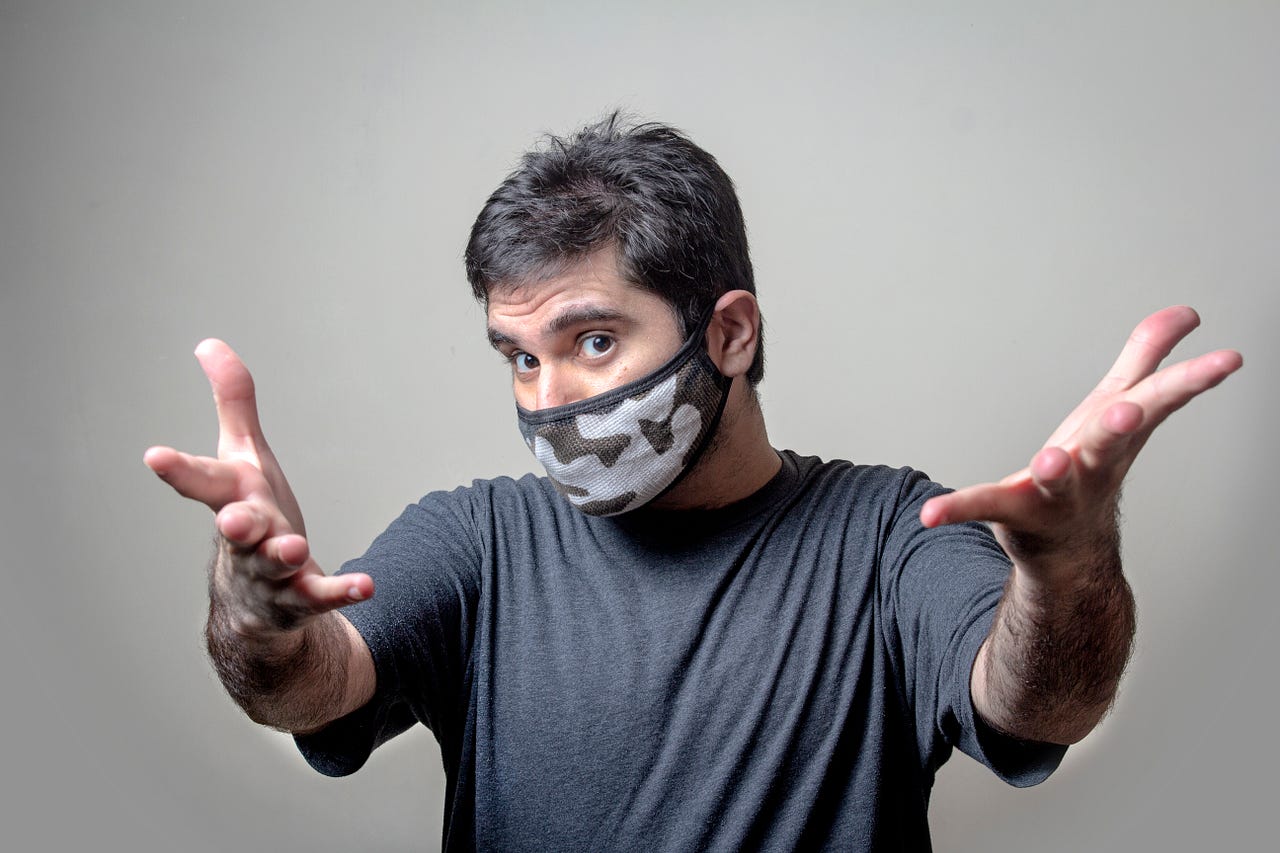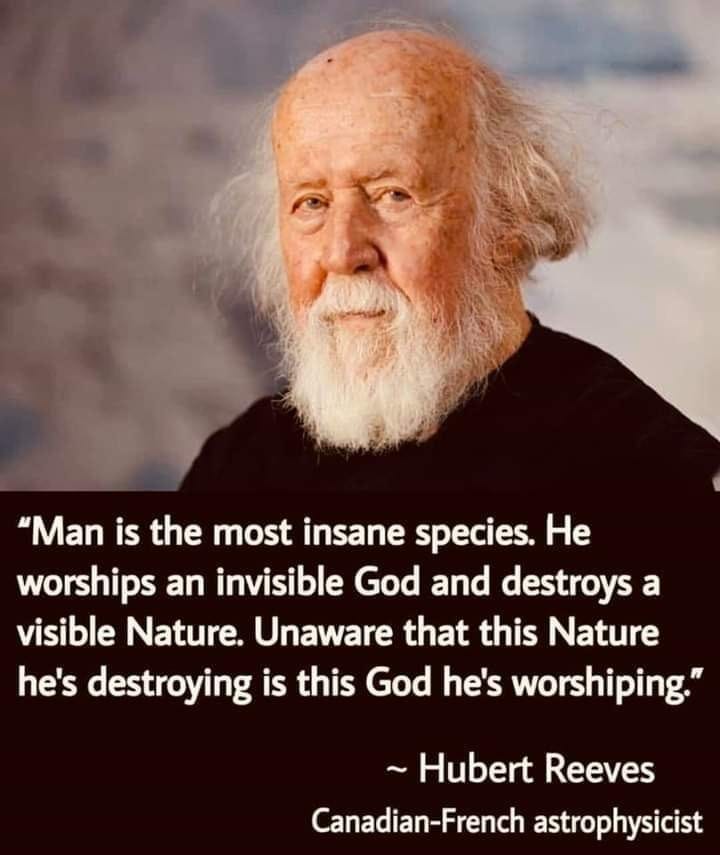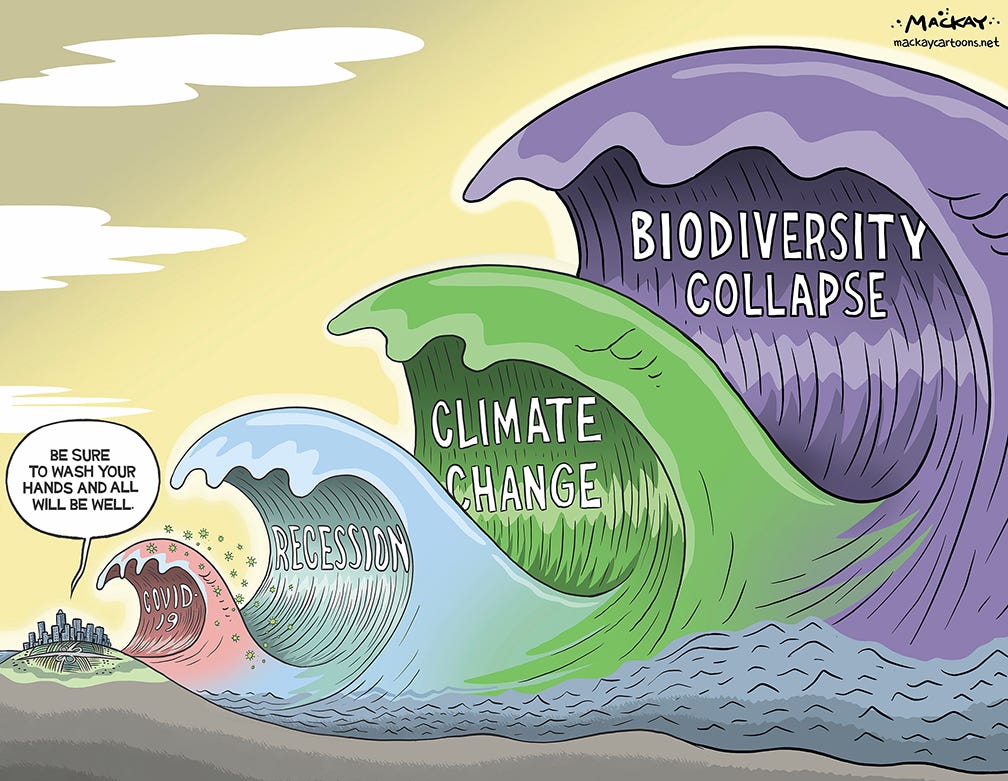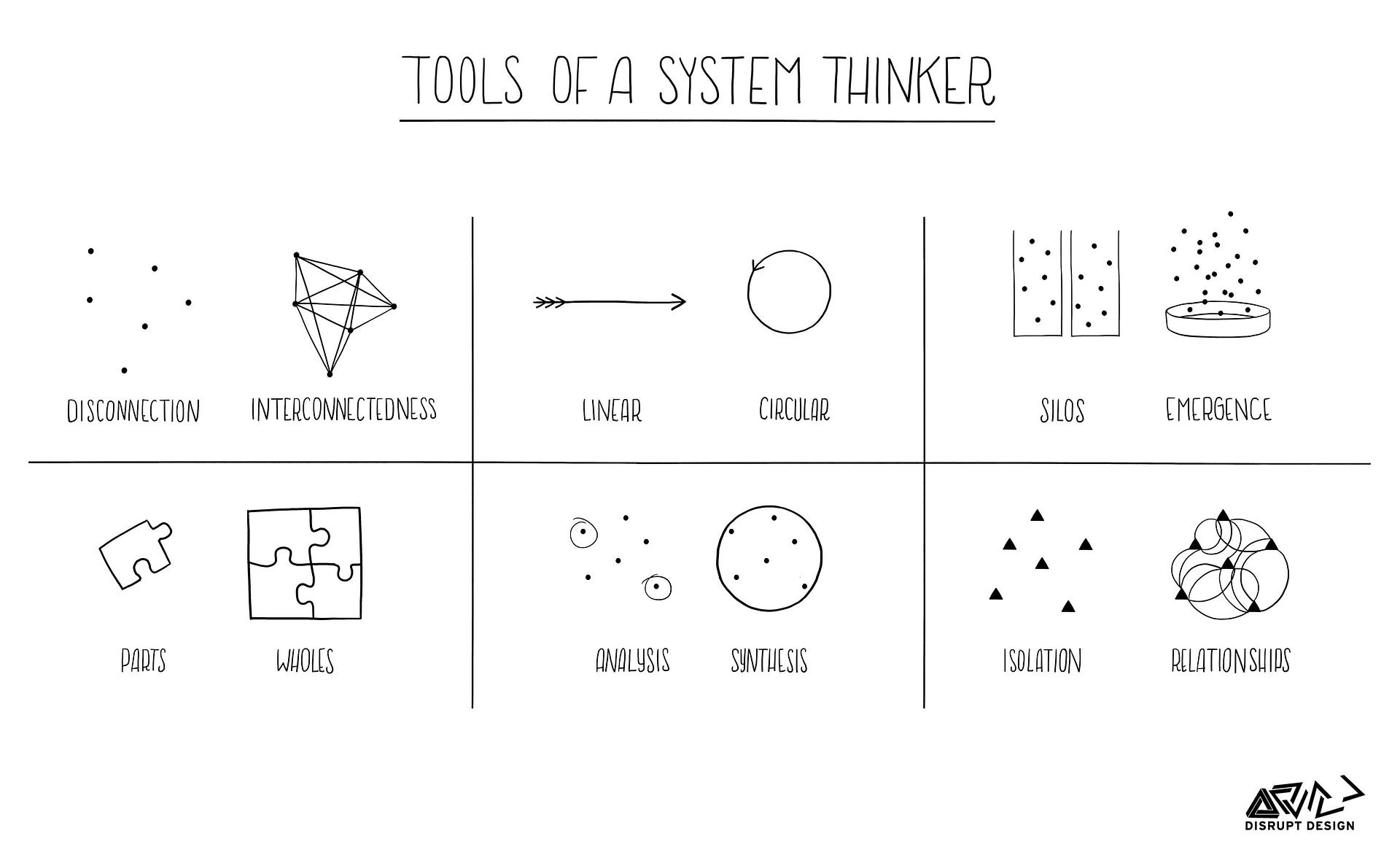The vaccines might give relief by numbing our fears, but the pandemic is really nature’s long overdue wake-up call to humankind.

Optimism is good, obstinacy is not. 2020 is done and dusted. People waited the year out for things to go back to normal. Most are still waiting for the return of the normal they’ve known, and to get their vaccine shots so they can go back to their familiar, ‘business as usual’ lives.
These recently approved vaccines — Moderna, Pfizer-BionTech and Oxford-Astrazeneca — will probably protect us humans from the COVID-19 virus. Going by the enthusiastic anticipation of the vaccine, it almost seems like we believe it will also inoculate us against the ills of our species, whereas, at best, it can be expected to numb our fears of social contact. Is it just me or are we experiencing a déjà vu moment here? The vaccine may temporarily suppress the symptom that’s the virus, while the real problem, viz. humanity’s irrational obsession with perpetual profitable growth, continues to simmer underneath.
The corona virus must be seen as a biological response of Gaia* — our living planet — to the ecological and social emergency that humanity has brought upon itself. ~Fritjof Capra
Fritjof Capra is a physicist who wrote the 1975 book The Tao of Physics: An Exploration of the Parallels Between Modern Physics and Eastern Mysticism.
Capra summarised his motivation for writing the book:
Mystics understand the roots of the Tao but not its branches; scientists understand its branches but not its roots. Science does not need mysticism and mysticism does not need science; but man needs both.
COVID-19 is a consequence of our all-too-human-centric approach to the planet: a disproportionate quest for profit maximisation has possibly led to the current viral plague which needs to be solved beyond the mere immediate symptom-resolution approach of the vaccine. This pandemic is a wake-up call for humanity to mend our ways. Unless, of course, we want COVID-21 (or some such) to continue on this deadly course.
In effect, we must invert our thinking habits from …
- Analytical to Systemic; and
- Focus on Shareholder Profit maximisation to holistic Value Creation.
… to a planet-first paradigm.
This imperative is neither novel nor new: “Everything has been said before, but since nobody listens we have to keep going back and beginning all over again.” ―André Gide.
Who’ll Inoculate Ma Nature?
While the speed and efficacy of the vaccine efforts by scientists are laudable, and the contribution of technological advancements undeniable, the question is, “are we solving the right problem or trying to be right in solving the wrong problem?” Systems thinking guru and Professor Emeritus of Management Science at the Wharton School, University of Pennsylvania, the late Russell Ackoff, put it nicely—
The more you keep solving the wrong problem right, the wronger you get.
What if the problem lies elsewhere? Humankind’s ways of politics and business over the last few centuries, specifically since the time we went industrial with life and living — and then consumerised entire societies — have pushed the planet over the edge (sic.). Even if we agree that humans are Ma Nature’s MOST favoured children, does it confer on a single species, the right to plunder the earth’s resources for its own gain or even simply for the fun of it? What if humans ARE the virus?

“Man is the most insane species. He worships an invisible God and destroys a visible Nature. Unaware that this Nature he’s destroying is the God he’s worshipping.” ~Hubert Reeves. (Canadian-French Astrophysicist)
By the end of the last century, humanity may have exceeded the earth’s carrying capacity¹. The problem, it seems, has to do with the uniquely human byproducts of technological advancement, like systematic habitat destruction. We appear to be using technology in a way that defeats its own purpose. Add to this “the massive intrusions into the ecological systems around the world, fuelled by corporate greed [that] have fragmented these systems and fractured the web of life.”
Capra notes that, “one of the many consequences of these harmful activities has been that viruses that used to live in symbiosis with animal species (where they did no harm) jumped from those species to others and to humans, where they are deadly.”
Our human-centricity prevents us from routinely comprehending that our activities don’t damage the planet, but only makes it increasingly hostile for human life: nature will reconfigure to another equilibrium, that is all.
Natural Stupidity Trumps Artificial Intelligence
The world has never been more connected: connectivity that has facilitated real-time collaborations across timezones, and equipped humanity with the unprecedented advantage of fighting the virus as one. And technologies that are accelerating simultaneously as they continue demonstrating an aspect of Moore’s Law (the well-known phenomenon of doubling in performance every 18 to 24 months), that technological growth is exponential. All this is good, except that the same technology that can save humankind also has the potential of fuelling corporate greed and concentrating power like never before.
In some ways the lockdowns of COVID-19 seem to have afforded us the luxury of reflecting and deciding if we want to return to our greedy, unfair, everyone-for-themselves competitive ways. For decades, activists and social scientists have been calling for sustainable practices. And for decades, traffic, air pollution and accidents have congested our streets and skies. Then, thanks to COVID-19, in just a few weeks, the roads go empty, skies clear and the music of nature falls sweetly on our ears.
COVID-19 has also reminded us that ME must not be at the expense of WE, because it has been clear for a while, even to the most ardent capitalists, that single-mindedly following the Western ‘I’-oriented way is unsustainable.
America, a veritable lap of luxury, ought to accept the largest share of responsibility for leading the prevailing culture of self-centred greed, that takes it to the point of making wastefulness a virtue. Cloaked in the garb of capitalism, economic success is touted as an end that can justify any and all means. American corporations, institutions and politicians think with their wallets, and common sense becomes a victim.
Wall Street practices anywhere else in the world, would be nothing short of criminal. This quote from a fund manager in the movie The Big Short, says it like it is, “I have a feeling, in a few years people are going to be doing what they always do when the economy tanks. They will be blaming immigrants and poor people.” How long can we fuel the ethos of love of money for money’s sake while ignoring the victims of financial corruption? How long will we keep rewarding the criminals with bonuses?
American Entrepreneur Nick Hanauer criticised³ the latest round of corporate bailouts in the CARES Act stimulus package that was passed into law last April. “People are economically hurting, and they resent the fact that billions upon billions of dollars are being poured into relief for large corporations.”
Hanauer thinks outrage is a logical response. “One of the reasons that we’re having to bail out all of these industries,” he said, “is that the industries themselves have been made fragile by decades of shareholder value maximization” instead of “building resilience.”
On the other hand, the vaccines were developed with little focus on profitability and in a spirit of global cooperation, proving that there is an alternative model to shareholder value+profit maximisation+each to himself, and it’s a much more happy one at that.
As early as July 2020, Safi Bahcall (on the Elevate Podcast ~53:00 min), showed us that,
“An unbelievable 250 therapies in development within 90 days,” and “Today we have anywhere between 100 to 1000 times the scientific resources directed at this virus than we had at Hepatitis-C, a couple of years back.”
I’m hoping that this ethos gains traction enough to move humankind’s fiercely competitive culture towards more badly needed global collaboration.
A Symptom Called Corona
We need new habits. In context of the COVID-19 crisis, the question facing us is, “Do these vaccines give us the licence to go back to our irrational obsession with perpetual exploitation of the earth’s resources?”
Sure, we need the shot in the arm (sic.) for protection, but that can’t be taken to mean that the virus will disappear. Will a new mutation jump to humans from a dry market another time around? As humans progressively destroy more and more of the habitats of other organisms, won’t we become the favoured hosts? Look at it from the corona virus’s point of view. All it’s doing is fighting for its own survival.
What if COVID-19 is actually a symptom, as is reflected by the accelerating effects of climate change? Is nature lashing out at humankind for its unheeded attack on the biodiversity balance of our planet? Could humans be their own biggest extinction risk?
Taking a Systems View
Try this experiment.
Take a child between two and five years old and give her an object she’s never seen before. Leave her alone with it. She will follow a 3-step process.
- Take it apart,
- Understand what the parts do,
- Assemble from the understanding of the parts, an understanding of the whole.
Namely, ANALYSIS.
Humankind’s entire culture is built on this type of analytical thinking. Analysis permeates all institutions, corporations and society. But we need, now, an uncommon sense of interactive relationships within and between wholes. Not just the occasional holistic insight that some of us experience in one realm or another as we muddle through life, but a total vision of the holistic landscape.
The straw that broke the camel’s back of the prevailing (analytical) thinking of the previous era was the concept of systems proposed by biologist Ludwig von Bertalanffy: in the 1920s he and others proposed the idea of a general theory⁴ of living systems that would embrace all levels of science, from the study of a single living cell to the study of society and the planet as a whole.
‘To better understand systems as the natural order of life on earth, we must look at the nature of the system itself.’
We are finally beginning to see what Ludwig von Bertalanffy and his colleagues outlined, that
>> The world is a system.
>> We as individuals are systems.
>> Our organisations and businesses are systems.
>> Our communities and our nations are systems.
And they are all interconnected***.
Perhaps we should begin to apply the principles of systems thinking to sort out the ways in which we are impacting the world as we know it, while we still have the opportunity to achieve sustainability.

According to Leyla Acaroglu,
systems thinking requires a shift in mindset, away from linear to circular. The fundamental principle of this shift is that everything is interconnected. We talk about interconnectedness not in a spiritual way, but in a biological sciences way.
Interconnectedness is an inherent property of systems. This has deep implications, key among which is that “the behaviour of any single part, has an effect on the whole.”

In this hard-hitting (12-minute) video⁵, Fritjof Capra exhorts us to act with extreme urgency.
“With the COVID pandemic, Gaia has presented us with valuable, life-saving lessons. The question is: will we have the wisdom and the political will to heed these lessons?
>> Will we shift from undifferentiated extractive growth to regenerative qualitative growth?
>> Will we replace fossil fuels with renewable energy sources for all our energy needs?
>> Will we stop excessive mass tourism and instead revitalize local communities?
>> Will we replace our centralized energy-intensive system of industrial agriculture with organic, community-oriented, regenerative farming?”
The Proof in the Pudding
As automobile traffic and industrial activities decreased dramatically during the lockdowns, the pollution of major cities around the world disappeared. After ages we were able to see the blue in our skies, the green in leaves, the clarity of rivers, hear the song of the birds and could once again partake of the glory of nature. The virus has been much more effective in reducing CO2 emissions and slowing climate breakdown than all the world’s policy initiatives combined. It is the radically reduced human activities that have resulted in this environmental regeneration.
In his 1996 book, The Web of Life, Fritjof Capra wrote brilliantly about the need for a new paradigm — a deep ecological shift — in our collective thinking as a species.
“A sustainable society is one that satisfies its needs without diminishing the prospects of future generations.” ~Lester Brown
‘There are solutions to the major problems of our time, some of them even simple. But they require a radical shift in our perceptions, our thinking, our values. And, indeed, we are now at the beginning of such a fundamental change of worldview in science and society, a change of paradigms as radical as the Copernican revolution. But this realization has not dawned on most of our political leaders.
Not only do our leaders fail to see how different problems are interrelated; they also refuse to recognize how their so-called solutions affect future generations. From the systemic point of view, the only viable solutions are those that are “sustainable”. The concept of sustainability has become a key concept in the ecology movement and is indeed crucial. Lester Brown of the Worldwatch Institute has given a simple, clear and beautiful definition: “A sustainable society is one that satisfies its needs without diminishing the prospects of future generations.”
In another article, I had posited that Nature puts all species (including humans) in balance with everything else. And this pandemic clearly reminds us to balance our ways before the planet does it for us. Nature is always re-writing its code of life making the COVID-19 crisis a stark reminder of its ways. Our obsession that everything has to be based on profit maximisation and shareholder value has created a nightmare economy for many. The theories guiding our economic decisions are obsolete and they do not account for the negative externalities*** when we take from the natural world.
“The world has enough for everyone’s needs, but not for everyone’s greed,” ~M K Gandhi
The Vaccine is NOT the (Whole) Solution
We are increasingly reliant on technology that automates bias. These systems were crafted by people who made hundreds of decisions, big and small, that led to the world we live in. In other words, these systems and all of their component parts were designed.
How do we think our way through the messes we’re in when the way we think is part of the mess?
—Nora Bateson
“(But) in our silo-ed world the crises that we perceive and address are also silo-ed, as is the habit of finding silo-ed solutions. Much like chopping off the Hydra’s heads, the resulting solutions that do not address the complexity seem only to generate more [negative] consequences⁶.

The most serious problems facing us now are not in any particular institution, but rather in the relationship between them.
If change is made it is a consequence of a shift not only in the problematized part, but in the combined conditions in which the system exists, be it a person, organization, forest, or society. Like an ecosystem the interdependencies of the institutional systems are interlinked and steeped together in patterns that make it difficult to create whole systems change,” explains Nora Bateson.
“If we actually want to change something, there’s very little realistic impact we can have on external factors. It’s more our internal functioning as a society that can change,” says Sabin Roman, research assistant at Centre for the Study of Existential Risk at Cambridge University.
The most serious problems facing us now are not in any particular institution, but rather in the relationship between them.
This internal functioning starts at the individual level. It doesn’t take much to understand that keeping the quest for material well-being down to what we need (agreed that prosperity is subjective), is likely more sustainable than the mindset of mindless greed.
Our fears, hopes and aspirations are firmly founded in the future. Part of the reason that people accumulate materials is to save for a “rainy day”, and this illusory safety-net ensnares them.
April Rinne explains what it means to let go of the future,
“letting go does not mean giving up or somehow failing. It is not surrender. It does mean letting go of our fears about the future, fears that hijack our brains and ability to function as our best selves. I would like to focus on what we could finally have time to learn, try, and invest our time in, especially at little to no cost. Relationships, sleep, mindfulness, and presence seem like great places to start.”
My belief is that individual transformation has exponential effects. Before we know it, it affects whole communities and spreads through society. The trick is the return of our collective consciousness to the natural order. If we collectively create a counter epidemic of sustainable behaviours, we will have learnt and leveraged the now possible. (Btw, there’s no such thing as the new normal or next normal or any ‘normal’.)
Systems thinking pioneer, Gregory Bateson, an English anthropologist, social scientist and cyberneticist, whose work intersected that of many other fields wrote, ‘the major problems in the world are the result of the difference between how nature works and the way people think,’ adding, ‘both society and the environment are profoundly sick, skewed and ravaged by the Western obsession with control and power, a mindset made all the more destructive by advances in technology. However, any attempt to put things right with more intervention and more technology can only be another manifestation of the same wrongheadedness.’
The shift is underway; part of the problem has been that, globally, nationally and personally, we face crises that can be described “wicked” problems and are not isolated issues for us to solve independently. They span interrelationships between soil, foliage, animals, weather patterns, bacteria and so on.
The natural order includes our species, but the converse is not true.
>> The mechanistic, reductionist, efficiency-driven approach must be replaced by systems thinking,
>> Anthropocentric approaches must be discarded to give way to planet-centric design,
>> New forms of research must deliver information that includes the interdependency within complex systems.
“The Earth does not belong to man; Man belongs to the Earth.
This we know.
All things are connected like the blood which unites one family.
Whatever befalls the Earth befalls the sons of the Earth.
Man did not weave the web of life, he is merely a strand in it.
Whatever he does to the web, he does to himself.”
— Chief Seattle, 1854 in a letter⁷ to the President of the USA.
Finding harmony with others and harmony with nature are foundational goals of Asian and other indigenous philosophies. While Indian traditions (Hinduism, Buddhism, and Jainism) focus largely on the individual’s path toward harmony with the cosmos, Chinese philosophies (Confucianism and Daoism) depend on finding the right Way (dao) to live a prosperous life — and on worthy rulers to administer the state in line with the right values.⁸
The shift from zero-sum competition to regenerative collaboration in a single leap is what the world needs. We must embrace the design philosophy of regenerative sustainability⁹: providing a better lifestyle through the making of improvements on as many physical systems around us as humanly possible so that we leave these systems, not just as good as, but better than we found them.
The ideal is that regenerative sustainability, as a lasting solution, requires a massive shift in the ideologies of individuals, corporations and world governments. The ideal is that the system-wide change needed to make regeneration a success can only be achieved with the active and committed participation of governments and corporations.
Our planet is a living entity and everything in it is interconnected. By taking a systems view of the post-pandemic world, we give ourselves a chance to thrive in harmony with nature AND all its children.
From Fritjof Capra’s Tao of Physics,
“In the Hindu view of nature, then, all forms are relative, fluid and ever-changing maya, conjured up by the great magician of the divine play. The world of maya changes continuously, because the divine lila is a rhythmic, dynamic play. The dynamic force of the play is karma, an important concept of Indian thought. Karma means “action”. It is the active principle of the play, the total universe in action, where everything is dynamically connected with everything else. In the words of the [Bhagavad] Gita, karma is the force of creation, wherefrom all things have their life.”
“If we can advance the knowledge of the world … if we can do things that expand the scope and scale of consciousness, then we’re better able to ask the right questions and become more enlightened. Really, the only thing that makes sense is to strive for greater collective enlightenment.” —Elon Musk¹⁰
Salim Ismail, Chairman of OpenExO, shares a profound insight from his father. “I asked my dad about his views on modern civilisation. His answer, ‘we have not civilised the world, we have materialised it!’ I think it’s time we went back to civilise it. The problems we’re facing are much bigger than the pandemic and we need collective systems transformation to deal with them.”
Pardon the cliche but, for our species, it is now or never.
___________________________________________________________________
*The Oxford English Dictionary defines Gaia as “the global ecosystem, understood to function in the manner of a vast self-regulating organism, in the context of which all living things collectively define and maintain the conditions conducive for life on earth”.
**There has been a surge in the numbers of researchers, theorists, academics, authors and consultants who have worked to unravel the mysteries of this complex body of science. Included in this group of systems thinkers are Buckminster Fuller, Fritjof Capra, Jay Forrester, Gregory Bateson, Peter Drucker, Peter Senge, Russell Ackoff, Margaret Wheatley, Dianne Ackerman, Mitchell Waldrop, Cliff McIntosh and Eric Trist.
***A negative externality is any difference between the private cost of an action or decision to an economic agent and the social cost. In simple terms, a negative externality is anything that causes an indirect cost to individuals. An example is the toxic gases that are released from industries or mines, these gases cause harm to individuals within the surrounding area and have to bear a cost (indirect cost) to get rid of that harm.
___________________________________________________________________
Selected References:
¹ Julia Layton—Has Earth reached its carrying capacity? https://science.howstuffworks.com/environmental/green-science/earth-carrying-capacity.htm
² Yuval Noah Harari — Homo Deus
³ Paul Constant—Coronavirus didn’t bring the economy down — 40 years of greed and corporate malfeasance did. https://www.businessinsider.com/pitchfork-economics-coronavirus-not-hurting-economy-corporate-greed-is-2020-4?IR=T
⁴ James McKinlay, Vicki Williamson—The systems thinking approach: the framework for developing a human resource management system. https://www.sciencedirect.com/book/9781843344230/the-art-of-people-management-in-libraries
⁵ Fritjof Capra — Gaia’s Lessons: A Systemic Analysis of Covid-19 — #FOODTALK https://youtu.be/f6ZH5BDY4G4
⁶ Nora Bateson — Warm Data. https://norabateson.wordpress.com/2017/05/28/warm-data/
⁷ Chief Seattle’s Letter—https://www.alexrovira.com/en/sensaciones/articulo/carta-del-jefe-indio-seattle
⁸ James D Sellman—Philosophy, Asian. https://rb.gy/sqtsxx
⁹ Nnaemek Ugochukwu—Sustainability Movement. https://ecowarriorprincess.net/2020/05/regenerative-sustainability-new-frontier-sustainability-movement/
¹⁰ Elon Musk—Most Shocking 2021 Predictions https://youtu.be/hKUOkiKHD8U


